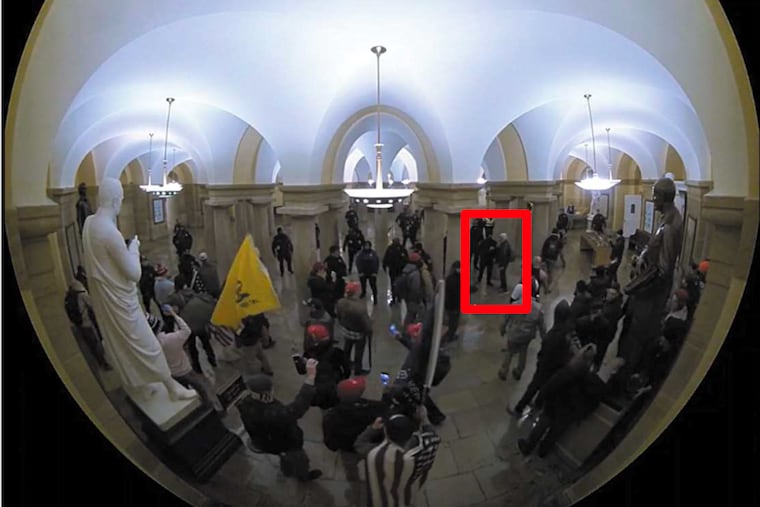Chesco man, 81, gets home detention and probation after acquaintances reported him to FBI for his involvement in Capitol riot
In federal court in Washington Tuesday, Gary Wickersham was sentenced to 90 days home detention and three years probation for his role in the Jan. 6 Capitol attacks.

A West Chester man whose acquaintances reported him to the FBI after receiving texts from him as he stormed the Capitol on Jan. 6 was sentenced to 90 days of home detention and three years of probation for his role in the riot.
In federal court in Washington Tuesday, Gary Wickersham, 81, was additionally ordered to pay a $2,000 fine and $500 in restitution toward the $1.5 million in damage to the Capitol caused by those rejecting the 2020 election results.
“The courts have to ensure that the deterrent value of our sentencing laws are such that we deter … not just you, but others in the future, from engaging in that type of conduct,” said U.S. District Judge Royce C. Lamberth, denying the defense’s request for a probation-only sentence.
Lamberth said Wickersham would be allowed to leave home with his probation officer’s approval for employment, education, religious services, and medical appointments.
The judge acknowledged the unusual nature of Wickersham’s case, taking special note of Wickersham’s age.
According to George Washington University’s Program on Extremism, which has tracked the demographics of at least 703 people arrested in the Capitol attack, the average age of people arrested is 39. Wickersham is one of the oldest people arrested in connection to Jan. 6, per the university’s data.
“It’s not like me to do that,” said Wickersham. “In my whole 81 years, that 22 minutes I spent in there, it was a dark blot … I regret doing it. I shouldn’t have been in there.”
Wickersham pleaded guilty in October to one misdemeanor count of parading, demonstrating, and picketing in a Capitol building.
Wickersham told federal investigators he’d taken a bus to attend President Donald Trump’s “Stop the Steal” rally on the Ellipse and would head to the Capitol before the conclusion of Trump’s speech. Wickersham described seeing protesters “cursing, screaming, knocking cops away, breaking windows and doors, and entering the Capitol,” but initially blamed antifa for the chaos.
According to the prosecution, Wickersham entered the Capitol within 60 seconds of the initial breach and was captured on video confronting law enforcement officers.
Wickersham would remain at the Capitol for about 22 minutes and showed little remorse for his actions when the FBI interviewed him on Jan. 15. Wickersham would initially tell authorities it was his right to enter the Capitol because he was a taxpayer — a comment Wickersham’s attorney Michael Noone characterized as poor phrasing.
Noone asserted his client’s actions were less severe than those of other rioters, saying Wickersham had no weapons and left the Capitol on his own accord. Noone argued a house arrest sentence would have a disproportionate impact on a man in his “golden years,” a military veteran who lost his wife in 2018.
The prosecution said Wickersham’s actions on Jan. 6 were similar to those of other defendants for whom the government has recommended incarceration. Still, prosecutor Sean P. Murphy said home detention was enough of a deterrent. Wickersham had no prior run-ins with the law, had a limited social media presence, and had “accepted responsibility early” by entering a plea deal.
Wickersham, one of more than 60 people arrested in Pennsylvania in connection to the events of Jan. 6, asked the judge for mercy.
“You shouldn’t have been in there, you admit you shouldn’t, you admit it was wrong, and you left,” said Lamberth. “I appreciate that and you get some credit for that.”